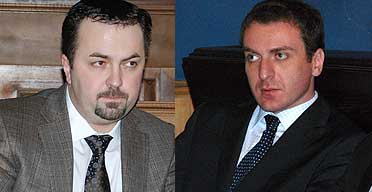
| Dimitri Shashkin (left) and Kakha Baindurashvili (right) – two new ministers. Photo: InterPressNews |
Slightly reshuffled cabinet, led by new PM Nika Gilauri won confidence vote in the Parliament on February 6 with 106 votes to 8. The parliamentary minority has voted against and some other individual lawmakers refused to participate in the voting.
Nika Gilauri, 33, who has replaced Grigol Mgaloblishvili, is Georgia’s fifth Prime Minister in five years. His cabinet includes two new ministers – one newcomer in the government, Dimitri Shashkin, the minister for penitentiary and probation and Kakha Baindurashvili, the finance minister, who previously served as deputy finance minister when Gilauri held the post before becoming the PM. Another minor change involves creation of the Ministry for Regional Development and Infrastructure, led by Davit Tkeshelashvili, who previously held the state minister’s post in charge of regional issues.
In his address to the lawmakers on February 6 the new PM outlined three key priorities of the cabinet: tackling economic difficulties and “fighting unemployment;” “de-occupation” of breakaway Abkhazia and South Ossetia and further democratic reforms.
‘Fighting Unemployment’
PM Gilauri said that his major focus would be “fighting unemployment.” “Although we have to acknowledge that it will not be an easy task,” he added.
In his previous remarks made in recent days on the matter, Gilauri was saying: “I won’t have two, three or four priorities; I will have one major goal – to create new jobs and fight against unemployment.”
He told the lawmakers on February 6, that the government would have a three-point plan, involving “direction of foreign aid towards creation of new jobs;” implementation of GEL 2.2 billion “economic stimulus package” and stimulating export and attracting of foreign investments.
He said that the Georgian economy proved to be “sustainable,” which did not collapse despite the August war; but difficulties, he continued, would remain because of the global financial crisis.
“All the statistical data were indicating that in September and October the Georgian economy was about to return back to its pre-war dynamic, but the global economic crisis – which we started to feel in November and October – hindered this process,” Gilauri said.
He also said that Georgia expected foreign investments this year, despite the global crisis, because these investments, he said, would mainly come from “quasi-state agencies” and corporations like Azeri state company SOCAR; Investment Authority of the UAE’s Ras Al Khaimah (RAK) emirate and the U.S.’s Overseas Private Investment Corporation (OPIC).
When questioned by the lawmakers from Christian-Democratic Party about the authorities’ last year’s promise to increase monthly pensions to up to USD 100, Gilauri acknowledged that it would not be possible to implement it this year.
“I am not promising that it will be this year, or next year, but our aim will be to have this in following years,” Gilauri said.
He also said it would be “USD 100 pension package,” which would include the state-funded health insurance for pensioners – thus hinting that it would not mean that pensioners would be able to receive USD 100 in cash.
Democratic Reforms
PM Gilauri told lawmakers that he planned to set up an inter-agency working group to coordinate further democratic reforms.
“The opposition is invited to join this group and Dimitri Shashkin [new minister for penitentiary and probations] will be the chairman of this group,” Gilauri said.
He said that the group would focus on the following issues: private property; introduction of jury system; strengthening of the parliament’s role and rights of inmates.
“There will be reforms and there will be a dialogue; we will meet you and discuss all the areas of reform targets,” Dimitri Shashkin said.
De-Occupation
PM Gilauri said that in its efforts to de-occupy Abkhazia and South Ossetia the government would pursue “a consistent policy.”
He said that it would aim at achieving international observers’ access to the breakaway regions and consequently transformation of EU monitoring mission into a peacekeeping mission.
Gilauri also said that Georgia remained committed to its NATO integration policy and “closer ties with the U.S. and EU.”
The parliamentary minority in which the Christian-Democratic Party is a leading force, refused to support the cabinet citing as one of the reasons “absence of novelties” in its program.
“The government boasts that it managed to avoid economic collapse after the August war; but it is not because of your policies, it is thanks to the international aid, that has been pledged by the international donors after the war,” MP Giorgi Targamadze, the leader of Christian-Democratic Party, said.
MP Petre Mamradze from ex-PM Zurab Nogaideli’s party party, Movement for Fair Georgia, said during the debates that the cabinet in Georgia has turned into “a decorative body” and it was a small group of insiders within the Saakashvili’s administration which exerted real decision-making process.
This post is also available in: ქართული
